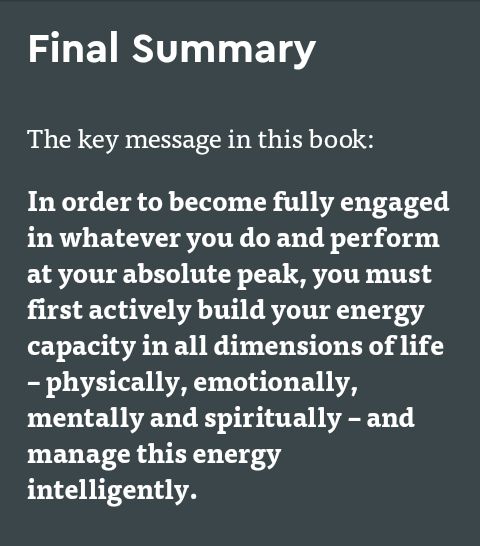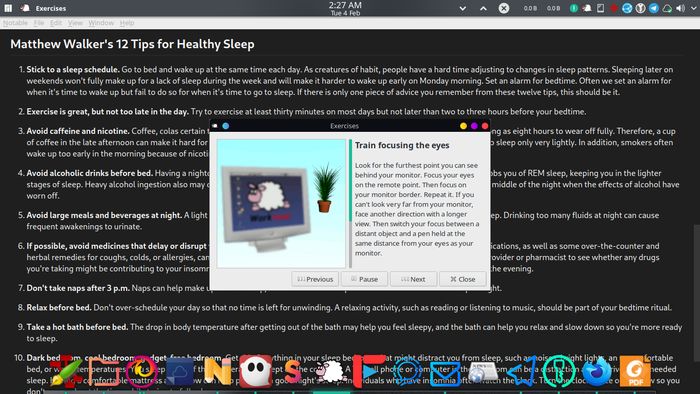Blinkist is one of those services that I've always wanted to use more often but keep on neglecting. People are divided by the idea of book summaries like this but I say it has its place in this modern age of reading. I've read quite a few of their summaries before but this would be the first time I'll be actively taking notes for one.

The Power of Full Engagement by Jim Loehr and Tony Schwartz has the following proposition:
Managing Energy, Not Time, is the key to High Performance and Personal Renewal
I even had those first four words written down on a whiteboard a few days ago because I read about it on an article. It must have been referencing this book.
The book posits that there are 4 energy levels we need to learn to manage: * Physical energy * Emotional flexibility * Mental endurance * Spiritual strength
"The energy of the human spirit can override even severe limitations of physical energy."
I can summarize the blinks into the following points:
- Take regular breaks every 90-120 minutes of work so you can do more with less time.
- Suggested break routines: take a walk, write down thoughts, read a book
- Eat healthy, drink enough water and sleep 7-8 hours every night.
- Keep in mind your deepest values through a vision statement.
- Face the truth and be honest with yourself.
- Rituals are important. Design them to incorporate all your values in your daily life.
I've been using Workrave for many years and I confess that many times I just put it in suspended mode when I get annoyed by the break reminders. It's a little app that will remind you to take regular breaks from using your computer.

By detecting keyboard and mouse activity, it measures how much time you've been spending on the computer. It may not be very accurate because it stops the timer when you are not using keyboard or mouse especially when you're just reading the screen because it's actually designed for the prevention of Repetitive Strain Injury (RSI). But it's the best tool I've found for the Pomodoro technique on a computer.
A lot of the points raised in the book are just the same good old advice though it's always good to be reminded of them. But the two things I am aware of needing much improvement in myself are regular breaks and sleep. So I better put that in practice right now. I'll leave you with something from my favorite non-fiction book last year, "Why We Sleep: Unlocking the Power of Sleep and Dreams".
Matthew Walker's 12 Tips for Healthy Sleep
-
Stick to a sleep schedule. Go to bed and wake up at the same time each day. As creatures of habit, people have a hard time adjusting to changes in sleep patterns. Sleeping later on weekends won't fully make up for a lack of sleep during the week and will make it harder to wake up early on Monday morning. Set an alarm for bedtime. Often we set an alarm for when it's time to wake up but fail to do so for when it's time to go to sleep. If there is only one piece of advice you remember from these twelve tips, this should be it.
-
Exercise is great, but not too late in the day. Try to exercise at least thirty minutes on most days but not later than two to three hours before your bedtime.
-
Avoid caffeine and nicotine. Coffee, colas certain teas, and chocolate contain the stimulant caffeine, and its effects can take as long as eight hours to wear off fully. Therefore, a cup of coffee in the late afternoon can make it hard for you to fall asleep at night. Nicotine is also a stimulant, often causing smokers to sleep only very lightly. In addition, smokers often wake up too early in the morning because of nicotine withdrawal.
-
Avoid alcoholic drinks before bed. Having a nightcap or alcoholic beverage before you sleep may help you relax, but heavy use robs you of REM sleep, keeping you in the lighter stages of sleep. Heavy alcohol ingestion also may contribute to impairment in breathing at night. You also tend to wake up in the middle of the night when the effects of alcohol have worn off.
-
Avoid large meals and beverages at night. A light snack is okay, but a large meal can cause indigestion, which interferes with sleep. Drinking too many fluids at night can cause frequent awakenings to urinate.
-
If possible, avoid medicines that delay or disrupt your sleep. Some commonly prescribed heart, blood pressure, or asthma medications, as well as some over-the-counter and herbal remedies for coughs, colds, or allergies, can disrupt sleep patterns. If you have trouble sleeping, talk to your health care provider or pharmacist to see whether any drugs you're taking might be contributing to your insomnia and ask whether they can be taken at other times during the day or early in the evening.
-
Don't take naps after 3 p.m. Naps can help make up for lost sleep, but late afternoon naps can make it harder to fall asleep at night.
-
Relax before bed. Don't over-schedule your day so that no time is left for unwinding. A relaxing activity, such as reading or listening to music, should be part of your bedtime ritual.
-
Take a hot bath before bed. The drop in body temperature after getting out of the bath may help you feel sleepy, and the bath can help you relax and slow down so you're more ready to sleep.
-
Dark bedroom, cool bedroom, gadget-free bedroom. Get rid of anything in your sleep bedroom that might distract you from sleep, such as noises, bright lights, an uncomfortable bed, or warm temperatures. You sleep better if the temperature is kept on the cool side. A TV, cell phone or computer in the bedroom can be a distraction and deprive you of needed sleep. Having a comfortable mattress and pillow can help promote a good night's sleep. Individuals who have insomnia often watch the clock. Turn the clock's face out of view so you don't worry about the time while trying to fall asleep.
-
Have the right sunlight exposure. Daylight is key to regulating daily sleep patterns. Try to get outside in natural sunlight for at least thirty minutes each day. If possible, wake up with the sun or use very bright lights in the morning. Sleep experts recommend that, if you have problems falling asleep, you should get an hour of exposure to morning sunlight and turn down the lights before bedtime.
-
Don't lie in bed awake. If you find yourself still awake after staying in bed for more than twenty minutes or if you are starting to feel anxious or worried, get up and do some relaxing activity until you feel sleepy. The anxiety of not being able to sleep can make it harder to fall asleep.